- Home
- Ernest Hemingway
Islands in the Stream Page 7
Islands in the Stream Read online
Page 7
“I don’t know, Schatz.”
“I wish something would happen beside the names of streets,” Andrew said. “I get tired of the names of streets in a place I’ve never been.”
“Make something happen, then, papa,” young Tom said. “We can talk about streets when we’re alone.”
“Nothing much happened then,” Thomas Hudson said. “We would go on down to the Place Saint-Michel and we would sit on the terrace of the café and Papa would sketch with a café crème on the table and you’d have a beer.”
“Did I like beer then?”
“You were a big beer man. But you liked water with a little red wine in it at meals.”
“I remember. L’eau rougie.”
“Exactement,” Thomas Hudson said. “You were a very strong l’eau rougie man but you liked an occasional bock.”
“I can remember in Austria going on a luge and our dog Schnautz and snow.”
“Can you remember Christmas there?”
“No. Just you and snow and our dog Schnautz and my nurse. She was beautiful. And I remember mother on skis and how beautiful she was. I can remember seeing you and mother coming down skiing through an orchard. I don’t know where it was. But I can remember the Jardin du Luxembourg well. I can remember afternoons with the boats on the lake by the fountain in the big garden with the trees. The paths through the trees were all gravelled and men played bowling games off to the left under the trees as we went down toward the Palace and there was a clock high up on the Palace. In the fall the leaves came down and I can remember the trees bare and the leaves on the gravel. I like to remember the fall best.”
“Why?” David asked.
“Lots of things. The way everything smelled in the fall and the carnivals and the way the gravel was dry on top when everything was damp and the wind on the lake to sail the boats and the wind in the trees that brought the leaves down. I can remember feeling the pigeons by me warm under the blanket when you killed them just before it was dark and how the feathers were smooth and I would stroke them and hold them close and keep my hands warm going home until the pigeons got cold too.”
“Where did you kill the pigeons, papa?” David asked.
“Mostly down by the Medici Fountain just before they shut the gardens. There’s a high iron fence all around the gardens and they shut the gates at dark and everyone has to go out. Guards go through warning people and locking up the gates. After the guards went ahead I used to kill the pigeons with a slingshot when they were on the ground by the fountain. They make wonderful slingshots in France.”
“Didn’t you make your own if you were poor?” Andrew asked.
“Sure. First I had one I made from a forked branch of a sapling I cut down in the Forest of Rambouillet when Tommy’s mother and I were on a walking trip there. I whittled it out and we bought the big rubber bands for it at a stationery store on the Place Saint-Michel and made the leather pouch out of leather from an old glove of Tommy’s mother.”
“What did you shoot in it?”
“Pebbles.”
“How close would you have to get?”
“As close as you could so you could pick them up and get them under the blanket as quick as you could.”
“I remember the time one came alive,” young Tom said. “And I held him quiet and didn’t say anything about it all the way home because I wanted to keep him. He was a very big pigeon, almost purple color with a high neck and a wonderful head and white on his wings, and you let me keep him in the kitchen until we could get a cage for him. You tied him by one leg. But that night the big cat killed him and brought him in to my bed. The big cat was so proud and he carried him just as though he were a tiger carrying a native and he jumped up to the bed with him. That was when I had a square bed after the basket. I can’t remember the basket. You and mother were gone to the café and the big cat and I were alone and I remember the windows were open and there was a big moon over the sawmill and it was winter and I could smell the sawdust. I remember seeing the big cat coming across the floor with his head high up so the pigeon barely dragged on the floor and then he made one jump and just sailed right up and into the bed with him. I felt awfully that he had killed my pigeon but he was so proud and so happy and he was such a good friend of mine I felt proud and happy, too. I remember he played with the pigeon and then he would push his paws up and down on my chest and purr and then play with the pigeon again. Finally I remember he and I and the pigeon all went to sleep together. I had one hand on the pigeon and he had one paw on the pigeon and then in the night I woke up and he was eating him and purring loud like a tiger.”
“That’s a lot better than names of streets,” Andrew said. “Were you scared, Tommy, when he was eating him?”
“No. The big cat was the best friend I had then. I mean the closest friend. I think he would have liked me to eat the pigeon too.”
“You ought to have tried it,” Andrew said. “Tel some more about slingshots.”
“Mother gave you the other slingshot for Christmas,” young Tom said. “She saw it in a gun store and she wanted to buy you a shotgun but she never had enough money. She used to look at the shotguns in the window every day when she went past the store to the Epicene and one day she saw the slingshot and she bought it because she was afraid they would sell it to somebody else and she kept it hid until Christmas. She had to falsify the accounts so you wouldn’t know about it. She’s told me about it lots of times. I can remember when you got it for Christmas and you gave me the old one. But I wasn’t strong enough to pull it then.”
“Papa, weren’t we ever poor?” Andrew asked.
“No. I’d gotten over being poor by the time you guys were born. We were broke lots of times but never really poor the way we were with Tom and his mother.”
“Tell us some more about in Paris,” David said. “What else did you and Tommy do?”
“What did we do, Schatz?”
“In the fall? We used to buy roasted chestnuts from a roast chestnut man and I used to keep my hands warm on them too. We went to the circus and saw the crocodiles of Le Capitaine Wahl.”
“Can you remember that?”
“Very well. The Capitaine Wahl wrestled with a crocodile (he pronounced it crowcodeel, the crow as in the bird of that name) and a beautiful girl poked them with a trident. But the biggest crocodiles wouldn’t move. The circus was beautiful and round and red with gold paint and smelled of horses. There was a place in back where you went to drink with Mr. Crosby and the tamer of lions and his wife.”
“Do you remember Mr. Crosby?”
“He never wore a hat nor an overcoat no matter how cold it was and his little girl had hair that hung down her back like Alice in Wonderland. In the illustrations I mean. Mr. Crosby was always very very nervous.”
“Who else do you remember?”
“Mr. Joyce.”
“What was he like?”
“He was tall and thin and he had a moustache and a small beard that grew straight up and down on his chin and he wore thick, thick glasses and walked with his head held very high. I remember him passing us on the street and not speaking and you spoke to him and he stopped and saw us through the glasses like looking out of an aquarium and he said, ‘Ah, Hudson, I was looking for you,’ and we three went to the café and it was cold outside but we sat in a corner with one of those what do you call thems?”
“Braziers.”
“I thought that was what ladies wore,” Andrew said.
“It’s an iron can with holes in it they burn coal or charcoal in to heat any place outside like a café terrace where you sit close to them to keep warm or a race track where you stand around and get warm from them,” young Tom explained. “At this café where papa and I and Mr. Joyce used to go they had them all along the outside and you could be warm and comfortable in the coldest weather.”
“I guess you’ve spent the biggest part of your life in cafés and saloons and hot spots,” the youngest boy said.
“Quite a bi
t of it,” Tom said. “Haven’t we, papa?”
“And sound asleep in the car outside while papa has just a quick one,” David said. “Boy, I used to hate that word quick one. I guess a quick one is about the slowest thing on earth.”
“What did Mr. Joyce talk about?” Roger asked young Tom.
“Gee, Mr. Davis, I can’t remember much about that time. I think it was about Italian writers and about Mr. Ford. Mr. Joyce couldn’t stand Mr. Ford. Mr. Pound had gotten on his nerves, too. ‘Ezra’s mad, Hudson,’ he said to papa. I can remember that because I thought mad meant mad like a mad dog and I remember sitting there and watching Mr. Joyce’s face, it was sort of red with awfully smooth skin, cold weather skin, and his glasses that had one lens even thicker than the other, and thinking of Mr. Pound with his red hair and his pointed beard and his nice eyes, with white stuff sort of like lather dripping out of his mouth. I thought it was terrible Mr. Pound was mad and I hoped we wouldn’t run into him. Then Mr. Joyce said, ‘Of course Ford’s been mad for years,’ and I saw Mr. Ford with his big, pale, funny face and his pale eyes and his mouth with the teeth loose in it and always about half open and that awful lather dripping down his jaws too.”
“Don’t say any more,” Andrew said. “I’ll dream about it.”
“Go on please,” David said. “It’s like werewolves. Mother locked up the werewolf book because Andrew had such bad dreams.”
“Did Mr. Pound ever bite anybody?” Andrew asked.
“No, horseman,” David told him. “It’s just a way of talking. He means mad out of his head mad. Not hydrophobia mad. Why did he think they were mad?”
“I can’t tell you,” young Tom said. “I wasn’t as young then as when we used to shoot pigeons in the gardens. But I was too young to remember everything and the idea of Mr. Pound and Mr. Ford with that dreadful slaver coming out of their mouths all ready to bite, drove everything out of my head. Did you know Mr. Joyce, Mr. Davis?”
“Yes. He and your father and I were very good friends.”
“Papa was much younger than Mr. Joyce.”
“Papa was younger than anybody, then.”
“Not than me,” young Tom said proudly. “I figure I was probably about Mr. Joyce’s youngest friend.”
“I’ll bet he misses you a lot,” Andrew said.
“It certainly is a shame he never could have met you,” David said to Andrew. “If you hadn’t been hanging around Rochester all the time he could have had the privilege.”
“Mr. Joyce was a great man,” young Tom said. “He wouldn’t have wanted to have anything to do with you two punks.”
“That’s your opinion,” Andrew said. “Mr. Joyce and David might have been pals. David writes for the paper at school.”
“Papa, tell us some more about when you and Tommy and Tommy’s mother were poor. How poor did you ever get?”
“They were pretty poor,” Roger said. “I can remember when your father used to make up all young Tom’s bottles in the morning and go to the market to buy the best and the cheapest vegetables. I’d meet him coming back from the market when I would be going out for breakfast.”
“I was the finest judge of poireaux in the sixth arrondissement,” Thomas Hudson told the boys.
“What’s poireaux?”
“Leeks.”
“It looks like long, green, quite big onions,” young Tom said. “Only it’s not bright shiny like onions. It’s dull shiny. The leaves are green and the ends are white. You boil it and eat it cold with olive oil and vinegar mixed with salt and pepper. You eat the whole thing, top and all. It’s delicious. I believe I’ve eaten as much of it as maybe anyone in the world.”
“What’s the sixth whatever it is?” Andrew asked.
“You certainly hold up conversation,” David told him.
“If I don’t know French I have to ask.”
“Paris is divided into twenty arrondissements or city districts. We lived in the sixth.”
“Papa, can we skip the arrondissements and you tell us something else?” Andrew asked.
“You can’t stand to learn anything, you athlete,” David said.
“I want to learn,” Andrew said. “But arrondissements is too old for me. You’re always telling me things are too old for me. I admit that is too old for me. I can’t follow it.”
“What’s Ty Cobb’s lifetime batting average?” David asked him.
“Three sixty-seven.”
“That’s not too old for you.”
“Cut it out, David. Some people like baseball and you like arrondissements.”
“I suppose we don’t have arrondissements in Rochester.”
“Oh cut it out. I just thought papa and Mr. Davis knew things that would be more interesting to everybody than those damn—Oh hell, I can’t even remember the name of them.”
“You’re not supposed to swear when we are around,” Thomas Hudson corrected.
“I’m sorry, papa,” the small boy said. “I can’t help it that I’m so damn young. I’m sorry again. I mean so young.”
He was upset and hurt. David could tease him pretty successfully.
“You’ll get over being young,” Thomas Hudson told him. “I know it’s hard not to swear when your feelings get working. Only don’t swear in front of grown people. I don’t care what you say by yourselves.”
“Please, papa. I said I was sorry.”
“I know,” Thomas Hudson said. “I wasn’t bawling you out. I was just explaining. I see you guys so seldom it makes a lot of explaining.”
“Not much really, papa,” David said.
“No,” Thomas Hudson said. “It isn’t much.”
“Andrew never swears in front of mother,” David said.
“Leave me out, David. It’s over, isn’t it, papa?”
“If you boys want to really know how to swear,” young Tom said, “you ought to read Mr. Joyce.”
“I can swear as much as I need,” David said. “At least for now.”
“My friend Mr. Joyce has words and expressions I’d never even heard of. I’ll bet nobody could outswear him in any language.”
“Then after that he made up a whole new language,” Roger said. He was lying on his back on the beach with his eyes closed.
“I can’t understand that new language,” young Tom said. “I guess I’m not old enough for it. But wait until you boys read Ulysses.”
“That’s not for boys,” Thomas Hudson said. “It isn’t really. You couldn’t understand it and you shouldn’t try to. Really. You have to wait till you’re older.”
“I read it all,” young Tom said. “I couldn’t understand practically any of it when I first read it, papa, just as you say. But I kept on reading it and now there’s part of it I really understand and I can explain it to people. It’s certainly made me proud that I was one of Mr. Joyce’s friends.”
“Was he really a friend of Mr. Joyce, papa?” Andrew asked.
“Mr. Joyce always used to ask about him.”
“You’re damn right I was a friend of Mr. Joyce,” young Tom said. “He was one of the best friends I ever had.”
“I don’t think you better explain the book much yet,” Thomas Hudson said. “Not quite yet. What part is it that you explain?”
“The last part. The part where the lady talks out loud to herself.”
“The soliloquy,” David said.
“Have you read it?”
“Oh sure,” David said. “Tommy read it to me.”
“Did he explain it?”
“As well as he could. Some of it’s a little old for both of us.”
“Where did you get hold of it?”
“In the books at home. I borrowed it and took it to school.”
“You what?”
“I used to read passages of it out loud to the boys and tell them how Mr. Joyce was my friend and how much time we used to spend together.”
“How did the boys like it?”
“Some of the more devout boys thought it was a little
strong.”
“Did they find out about it at school?”
“Sure. Didn’t you hear, papa? No, I guess that was when you were in Abyssinia. The headmaster was going to expel me but I explained Mr. Joyce was a great writer and a personal friend of mine so finally the headmaster said he’d keep the book and sent it home and I promised I’d consult him before I read anything else to the boys or attempted to explain any classics. First, when he was going to expel me, he thought I had a dirty mind. But I haven’t got a dirty mind, papa. That is, not any dirtier than anybody else’s.”
“Oh yes. He was going to confiscate it but I explained it was a first edition and that Mr. Joyce had written in it for you and that he couldn’t confiscate it because it wasn’t mine. I think he was very disappointed not to confiscate it.”
“When can I read that book by Mr. Joyce, papa?” Andrew asked.
“Not for a long time.”
“But Tommy read it.”
“Tommy is a friend of Mr. Joyce.”
“Boy, I’ll say I am,” said young Tom. “Papa, we never knew Balzac, did we?”
“No. He was before our time.”
“Nor Gautier? I found two swell ones by them at home too. The Droll Stories and Mademoiselle de Maupin. I don’t understand Mademoiselle de Maupin at all yet but I am reading it over to try to and it’s great. But if they weren’t friends of ours I think they would expel me sure if I read them to the boys.”
“How are they, Tommy?” David asked.
“Wonderful. You’ll like them both.”
“Why don’t you consult the headmaster as to whether you can read them to the boys?” Roger said. “They’re better than what the boys will dig up for themselves.”
“No, Mr. Davis. I don’t think I’d better. He might get that dirty-mind idea again. Anyway, with the boys it wouldn’t be the same as though they were friends of mine like Mr. Joyce. Anyway I don’t understand Mademoiselle de Maupin well enough to explain it and I wouldn’t have the same authority explaining it as when I had Mr. Joyce’s friendship to back me up.”

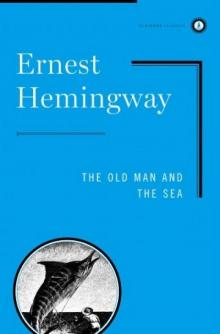 The Old Man and the Sea
The Old Man and the Sea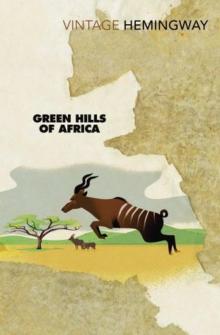 Green Hills of Africa
Green Hills of Africa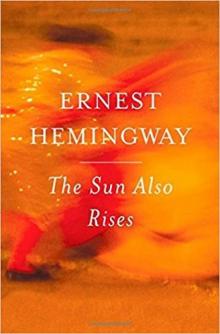 The Sun Also Rises
The Sun Also Rises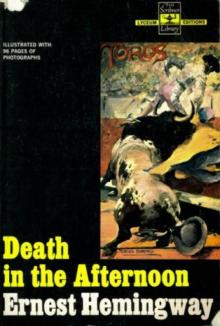 Death in the Afternoon
Death in the Afternoon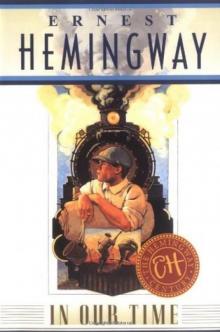 In Our Time
In Our Time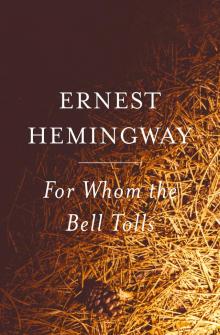 For Whom the Bell Tolls
For Whom the Bell Tolls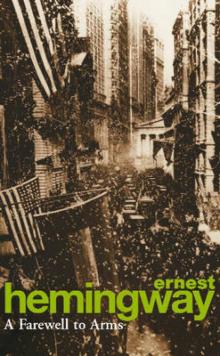 A Farewell to Arms
A Farewell to Arms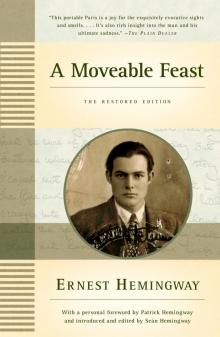 A Moveable Feast
A Moveable Feast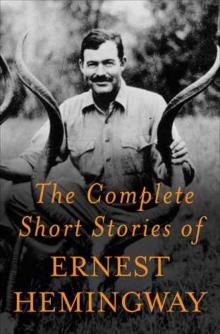 The Complete Short Stories of Ernest Hemingway
The Complete Short Stories of Ernest Hemingway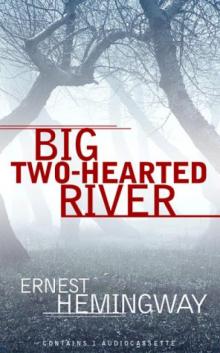 Big Two-Hearted River
Big Two-Hearted River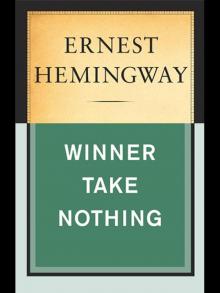 Winner Take Nothing
Winner Take Nothing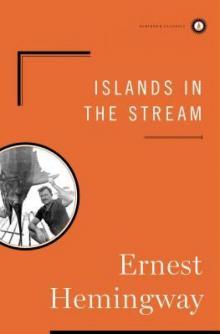 Islands in the Stream
Islands in the Stream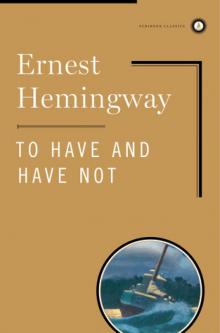 To Have and Have Not
To Have and Have Not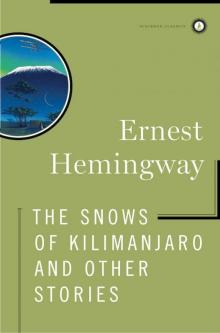 The Snows of Kilimanjaro and Other Stories
The Snows of Kilimanjaro and Other Stories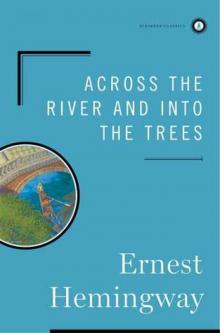 Across the River and Into the Trees
Across the River and Into the Trees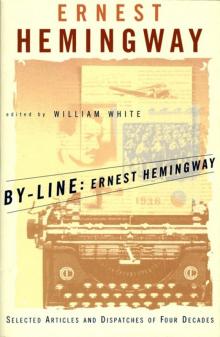 By-Line Ernest Hemingway
By-Line Ernest Hemingway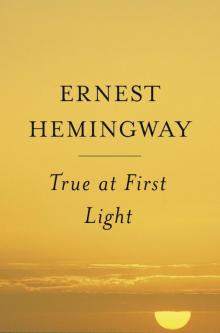 True at First Light
True at First Light Men Without Women
Men Without Women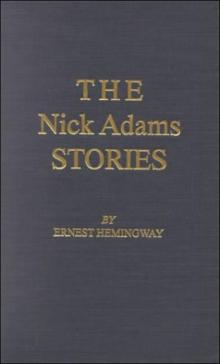 The Nick Adams Stories
The Nick Adams Stories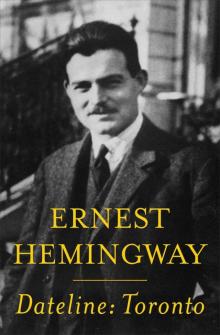 Dateline- Toronto
Dateline- Toronto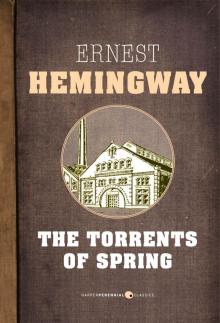 The Torrents of Spring
The Torrents of Spring Short Stories
Short Stories